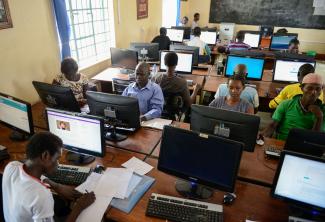Digital technology
Choosing the right approach

On the upside, digital measurement programmes in health care are dramatically reducing the cost of assessing patients. On the downside, jobs are being lost to artificial intelligence. To agencies involved in international development affairs, these trends matter – not least, because they themselves use digital technology in interaction with their partners in the Global South.
Welthungerhilfe, the Bonn-based non-denominational charity, is taking a digital approach to eradicating malnutrition in India, pooling resources with tech companies. Cameras and algorithms serve to take children’s measurements. The cost of data collection was thus reduced from $ 15 per child to a mere $ 0,10. Aid professionals from Protestant agencies appreciate that this method not only reduces costs, but also considerably lessens the work load of health staff who can use precious time for other tasks.
The developing world is rapidly digitalising. Kathleen Ziemann of the GIZ, a government agency, points out that only four percent of people had access to the internet in Dar es Salaam in 2014. Just three years later the share had jumped to 40 %. People around the world are gaining access to the internet and technology.
Access to the internet often enables job creation in places with high unemployment. People in developing countries can even earn money working for foreign companies online. As one participant said, digitalisation supersedes physical boundaries, which could potentially allow people to access more lucrative economies without leaving their home country.
Anke Domscheit-Berg, a maverick politician who currently belongs to the Leftist faction in the German Bundestag, suggests that developed nations should create digital platforms to encourage people in developing countries to bring in capital and reduce their unemployment rates. She wants websites and apps to serve freelancers’ marketing needs – for instance, by connecting a programmer in Nigeria with an employer in Australia or Japan. The idea is to connect skilled, but unemployed youth to established businesses in areas where their skills are in demand.
Moreover, e-learning offers people the ability to become skilled outside typical classroom settings. That can benefit even people in areas with poor transport infrastructure and few educational opportunities – if they have access to the internet. Thanks to smartphones, that is no longer completely unusual.
On the other hand, people in the Global South are losing out to digitalisation. Manual labour jobs are being lost to robots – for example, in harbour’s increasingly automated container terminals. Jobs are also lost to artificial intelligence. Meanwhile, programming and robot design are mostly done in the Global North. But this doesn’t need to be the case, as participants in the Protestant Church’s annual development-policy conference argued this year in Berlin. They want faith-based agencies to empower people in developing countries, including by applying high technology.
Huge challenges persist, however. For instance, racism can be embedded in software programmes. In Berlin, several speakers mentioned “racist robots”, which racially profile dark-skinned people by collecting less data for facial recognition. This technological bias was used as an example for why the developing world – especially Africa – needs to play an active role in digitalisation.






